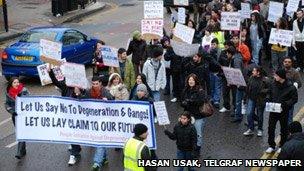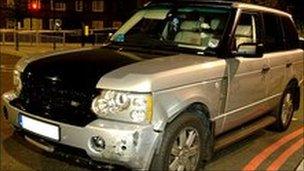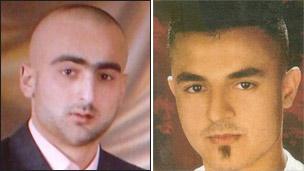Could Turkish and Kurdish gangs become new 'mafia'?
- Published
Two people have been convicted in connection with a war between two gangs in north London. One local MP fears a "mafia-style" conflict.
When 20-year-old Yusuf Arslan was stopped in the street one night in September last year he was not cowed by the sight of armed police.
Quite the opposite.

There have been demonstrations against the gangs in north London
Kitted out in body armour, he claimed he was one of the main players in north London and could get hold of better weapons than Scotland Yard's Heckler & Koch MP5 sub-machine guns.
A few weeks later Arslan, whose Tottenham Boys gang are involved in a bloody feud with the rival Hackney Turks, was on the streets again seeking to back up his boasts.
Armed with a Croatian-made Agram sub-machine gun, he flagged down a Ford Transit van in a Tottenham street.
He fired four shots at the occupants, Nasir Demir and Hamit Koban, but they escaped serious injury by reversing the van away at high speed.
At Arslan's recent trial Mr Demir, giving evidence from behind a curtain, said he was an innocent businessman but, asked why he had been shot at, he said: "Gang-related. Because they want control. If you ever get in the way they get you out of the way."
In London alone there are an estimated 50,000 Turks, not including Turkish Cypriots, and 200,000 Kurds from Turkey, Iran, Iraq and Syria.
The Tottenham Boys and Hackney Turks gangs are understood to include both Turks and Kurds.
The feud has claimed at least two lives in the last 12 months - Oktay Erbasli, 23, and Cem Duzgun, 21 - and one local MP believes the violence could get worse.
David Lammy, MP for Tottenham, told the BBC: "Gang-related activity in the Turkish-speaking community is a serious issue on the streets of London and we need far more focused action.
"We need far more Turkish-speaking officers dealing with this and I sense that the community itself is fearful and racketeering, money laundering and intimidation is going on and it has to come to an end."
Mr Lammy said: "I'm genuinely worried about the escalation of violence and the young lives that are being lost in this parallel world of criminality.
"I don't want to see the kind of developments that exist in New York played out in the streets of London, a kind of mafia-style community."
Metropolitan Police commissioner Sir Paul Stephenson rejected the criticism and said: "This is a challenge but we have had some successes."
A Scotland Yard spokeswoman said the force had 24 Turkish-speaking officers and she said officers from the Safer Neighbourhoods Team in Hackney had recently visited Istanbul, Kahramanmaras and Elbistan as guests of the Turkish police.
She said they were now devising a training package to help them working among Hackney's Turkish population.
'Tit-for-tat crime'
Arslan - who was himself shot in 2007 and only survived after an operation to remove his spleen - was convicted at Kingston Crown Court of attempted murder and firearms offences last month.
A second man, Emre Kamalak, 24, admitted possessing a loaded snubnose Brocock revolver and a third man, Abdullah Cicekdegli, 26, was acquitted of possessing the gun.
The trio had been stopped by armed police in a minicab in the early hours of 9 December 2009.
Duncan Penny, prosecuting, told Kingston Crown Court: "These incidents were connected with an ongoing dispute between two groups - the Tottenham Boys and the Hackney Turks - both incidents arose from gang rivalry and tit-for-tat serious criminality that is associated with it."
Mr Penny said Arslan mentioned Mr Erbasli's death after his arrest on 8 October.
Mr Penny said: "He said at the end of the day he knew who had killed his friend but he did not know which one of the Hackney boys it was."
Many Kurds in London are Alevis - an unorthodox Islamic sect - and Israfil Erbil, chairman of the Alevi Cultural Centre in Dalston, said: "They started up as groups against other nations and now it's fighting between boroughs, like Tottenham and Hackney."

Oktay Erbasli's Range Rover was riddled with bullets
He said: "In the beginning it was fairly innocent, just young boys fighting but now other things are getting into it, like drugs and money. Lately I have seen some of them driving around in luxury cars and most of them are not working."
Mr Erbil told the BBC: "It's like an alternative way of life. If they feel lonely they join a group and feel stronger.
"I asked one guy why he joined and he said he had been beaten up and he found this group and they helped him and he became one of them."
Janroj Keles, from London Metropolitan University, who has researched the problems facing the Kurdish and Turkish population in the capital, said there was a generation gap.
He said: "The young people have a different understanding of the world from their parents.
"They want to dance and have sex and be part of consumer society and 'youth culture' in the inner cities. They try to be 'cool' by identifying with hip-hop and gang culture.
"There is very little communication between parents and young people so the parents cannot guide them.

The murders of Oktay Erbasli (left) and Cem Duzgun remain unsolved
"Many young Kurdish and Turkish people have been let down by the education system so getting involved with drugs and gangs seems to them like 'easy money' without thinking of the consequences."
He said part of the problem was that the younger generation had not done well at school partly because of the language barrier and partly because their parents had been too busy working long hours.
Mr Keles said similar gangs operated in Germany, especially in Berlin and Hamburg.
The murder of Mr Duzgun and Mr Erbasli remain unsolved. Anyone with information about Mr Duzgun's murder should call the police on 020 8785 8244 and anyone with information about Mr Erbasli's death can call 020 8358 0100. Alternatively call Crimestoppers on 0800 555111.
- Published21 October 2010